- Home
- Bill Bryson
Bryson's Dictionary For Writers And Editors (v5.0) Page 5
Bryson's Dictionary For Writers And Editors (v5.0) Read online
Page 5
Book-of-the-Month Club.
Boonyaratglin, Gen. Sonthi. (1946–) Leader of military coup in Thailand in 2006; on second reference he is Gen. Sonthi.
Boorstin, Daniel. (1914-2004) American historian.
Bophuthatswana. Former South African black homeland; capital Mmabatho. Reintegrated into South Africa in 1994.
bordellos.
Borders Books and Music. (No apos.)
Borghese. Noble Italian family.
Borgia, Rodrigo. (1431-1503) Pope Alexander VI, father of Cesare Borgia (1476-1507) and Lucrezia Borgia (1480-1519).
Borglum, Gutzon. (1871-1941) American sculptor, designer of the presidential memorial at Mount Rushmore; full name John Gutzon de la Mothe Borglum.
Bormann, Martin. (1900-1945) Nazi politician.
born, borne. Both are past participles of the verb bear, but by convention they are used in slightly different ways. Born is limited to the idea of birth (“He was born in December”). Borne is used for the sense of supporting or tolerating (“She has borne the burden with dignity”), but is also used to refer to giving birth in active constructions (“She has borne three children”) and in passive constructions followed by “by” (“The three children borne by her…”).
Borodin, Alexander (Porfiryevich). (1833-1887) Russian composer.
borscht.
Börse, Borsa, Bourse. Respectively German, Italian, and French for stock exchange.
Bosch, Hieronymus. (c. 1450-1516) Dutch painter, born Hieronymus van Aken.
bo’s’n, bosun, bo’sun are all abbreviations of boatswain, a naval officer; not to be confused with boson, a type of subatomic particle.
Bosnia and Herzegovina/Bosnia-Herzegovina. Serbian republic, formerly part of Yugoslavia; capital Sarajevo.
Bosporous, not Bosph-, for the strait separating Europe and Asia.
BOSS. Bureau for (not of) State Security, former South African intelligence department.
both. Three small problems to note:
1. Both should not be used to describe more than two things. Partridge cites a passage in which a woman is said to have “a shrewd common sense…both in speech, deed and dress.” Delete both.
2. Sometimes it appears superfluously: “…and they both went to the same school, Charterhouse” (Observer). Either delete both or make it “…they both went to Charterhouse.”
3. Sometimes it is misused for each. To say that there is a supermarket on both sides of the street suggests that it is somehow straddling the roadway. Say either that there is a supermarket on each side of the street or that there are supermarkets on both sides. (See also EACH.)
both…and. “He was both deaf to argument and entreaty” (cited by Gowers). The rule involved here is that of correlative conjunctions, which states that in a sentence of this type both and and should link grammatically similar entities. If both is followed immediately by a verb, and should also be followed immediately by a verb. If both immediately precedes a noun, then so should and. In the example above, however, both is followed by an adjective (deaf) and and by a noun (entreaty).
The sentence needs to be recast, either as “He was deaf to both argument [noun] and entreaty [noun]” or as “He was deaf both to argument [preposition and noun] and to entreaty [preposition and noun].”
The rule holds true equally for other such pairs: “not only…but also,” “either…or,” and “neither…nor.”
Botswana. Southern African republic, formerly Bechuanaland; capital Gaborone. The people are Batswana (sing. and pl.).
Botticelli, Sandro. (c. 1445-1510) Italian painter, born Alessandro di Mariano di Vannik Filipepi.
bottleneck, as Gowers notes, is a useful, if sometimes overworked, metaphor to indicate a point of constriction. But it should not be forgotten that it is a metaphor and therefore capable of cracking when put under too much pressure. To speak, for instance, of “a worldwide bottleneck” or “a growing bottleneck” sounds a note of absurdity. Bottlenecks, even figurative ones, don’t grow, and they don’t encompass the earth.
Boucicault, Dion. (1822-1890) Irish playwright; pronounced boo'-see-ko.
Boudicca (d. AD 62) is now the more common spelling for the Celtic queen traditionally known as Boadicea. Queen of the Iceni, she led an unsuccessful revolt against the Romans.
bougainvillea.
bouillabaisse. Not -illi-.
bouillon. Not -ion. Broth.
bourgeois, bourgeoisie.
Bourgogne. The French name for Burgundy.
boustrophedon. Writing in which alternate lines go from right to left and left to right.
boutonnière. Flower for buttonhole.
Boutros-Ghali, Boutros. (1922–) Egyptian politician and civil servant; secretary-general of the United Nations (1992-96).
Bouygues Group. French construction company.
bouzouki. Greek stringed musical instrument.
Bowes Lyon. (No hyphen.) Family name of the late British Queen Mother.
boyfriend, girlfriend. (Each one word.)
boysenberry.
Brady, Mathew. (1823-1896) American Civil War photographer. Note irregular spelling of first name.
braggadocio. Hollow boasting, after the character Braggadochio in Spenser’s Fairie Queene.
Brahman/Brahmin. The first is a member of a Hindu caste; the second is used to describe long-established socially exclusive people (“Boston Brahmins”). The breed of cattle is spelled Brahman.
Brahmaputra. Asian river.
Brahms, Johannes. (1833-1897) German composer.
Braille, Louis. (1809-1852) French inventor of the embossed reading system for the blind.
Bramante, Donato di Pasuccio d’Antonio. (1444-1514) Italian architect and artist.
Brancusi, Constantin. (1876-1957) Romanian sculptor.
Brandeis, Louis D(embitz). (1856-1941) American jurist; Brandeis University is named for him.
Brandywine. Creek in Pennsylvania and Delaware, site of a battle in the Revolutionary War.
Braque, Georges. (1882-1963) French Cubist painter.
Brasenose College, Oxford University.
Brasília. Capital of Brazil.
Braun, Wernher von. (1912-1977) German-born American space scientist.
bravado should not be confused with bravery. It is a swaggering or boastful display of boldness, often adopted to disguise an underlying timidity. It is, in short, a false bravery and there is nothing courageous about it.
BRD. Abbreviation of Bundesrepublik Deutschland.
breach, breech. Frequently confused. Breach describes an infraction or a gap. It should always suggest break, a word to which it is related. Breech applies to the rear or lower portion of things. The main expressions are breach of faith (or promise), breech delivery, breeches buoy, breechcloth, and breech-loading gun.
Breakspear, Nicolas. (c. 1100-1159) Pope Adrian IV.
Brest-Litovsk, Treaty of. (1918) Treaty that ended Russian involvement in World War I.
Bretagne. French for Brittany.
Bretton Woods. Mountain resort in New Hampshire, site of 1944 conference that led to the establishment of the International Monetary Fund and World Bank.
Breuer, Marcel. (1902-1981) Hungarian-born American architect and designer.
Breugel/Breughel. Use Brueghel.
Brezhnev, Leonid (Ilyich). (1906-1982) Leader of the Soviet Union (1977-1982).
bric-a-brac.
Bridge of San Luis Rey, The. Novel by Thornton Wilder (1927).
brie. (Not cap.) Cheese.
Brillat-Savarin, Anthelme. (1755-1826) French gastronome.
Bristol-Myers Squibb. U.S. pharmaceuticals company.
Britannia, Britannic, but Brittany for the region (formerly a province) of France. The song is “Rule, Britannia,” with a comma.
British aristocracy, or peerage, comprises, in descending order, the ranks duke, marquess, earl/countess, viscount, and baron/baroness. Male peers below the rank of duke may be referred to as Lord (i.e., the Earl of Avon may be
called Lord Avon), and all peeresses may be referred to as Lady. However, not every lord is a peer. The eldest son of a duke, marquess, or earl, for instance, may use one of his father’s minor titles as a courtesy title and call himself the Marquess of X or Earl of Y, but he is not a peer and is not allowed to sit in the House of Lords. Younger sons of dukes and marquesses may put Lord in front of their names: Lord John X. Their wives are then called Lady John X. Daughters of dukes, marquesses, and earls will similarly put Lady before their names: Lady Mary Y. Wives of other kinds of peers, and of knights and baronets, are referred to as Lady X or Lady Y; that is, their first names are not used. Sir John Blogg’s wife is simply Lady Blogg, not Lady Mary Blogg. Life peers are people of distinction who are elevated to the peerage but whose titles die with them.
British Guiana. Former name of the South American country now known as Guyana.
British Honduras. Former name of Belize.
British Indian Ocean Territory. Group of 2,300 scattered islands in the Indian Ocean run as a British colony; principal island Diego Garcia.
Britten, (Edward) Benjamin. (1913-1976) English composer; later Baron Britten of Aldeburgh.
Brobdingnag. Not -dig-. Place inhabited by giants in Gulliver’s Travels.
broccoli.
Bronfman, Edgar M(iles). (1929–) Canadian businessman.
Brontë, Anne (1820-1849), (Patrick) Branwell (1817–1848), Charlotte (1816-1855), and Emily (Jane) (1818-1848): English literary family. Among their best-known works are Emily’s Wuthering Heights, Charlotte’s Jane Eyre, and Anne’s The Tenant of Wildfell Hall.
brontosaurus. Not bronta-. Type of dinosaur.
Brooke, Rupert (Chawner). (1887-1915) English poet.
Brookings Institution (not Institute), Washington, D.C.; named after Robert Somers Brookings (1850-1932), American philanthropist.
Brooks, Van Wyck. (1886-1963) American critic and historian.
brouhaha. An uproar.
Brown v. Board of Education. 1954 landmark civil rights case in which the Supreme Court ruled that segregated schools were illegal. See also PLESSY V. FERGUSON.
brucellosis. Disease of cattle.
Brueghel, Pieter, the Elder. (c. 1520-1569) Not -eu-. Flemish painter and father of two others: Pieter Brueghel the Younger (1564-1638) and Jan Brueghel (1568-1625).
Bruges (Fr.)/Brugge (Flemish). Historic city in northern Belgium.
Brummell, (George Bryan) Beau. (1778-1840) Celebrated English dandy.
Brundtland, Gro Harlem. (1939–) Norwegian prime minister (1981, 1986-1989, 1990-1996).
Bruneau-Jarbidge. Site of historic supervolcano in Idaho.
Brunei. Independent oil-rich state on Borneo; capital Bandar Seri Begawan. A native is a Bruneian.
Brunel, Isambard Kingdom. (1806-1859) British engineer; son of Sir Marc Isambard Brunel (1769-1849), also an engineer.
Brunelleschi, Filippo. (c. 1377-1446) Renaissance architect and sculptor.
Brunhild. In Scandinavian sagas, she is a Valkyrie, or priestess, in a deep sleep. In Wagner’s Ring cycle, the name is spelled Brünnhilde.
Brussels. Capital of Belgium. In French, Bruxelles; in Flemish, Brussel.
brussels sprouts. (No cap., no apos.)
Bryan, William Jennings. (1860-1925) American lawyer, orator, and politician.
Bryant, William Cullen. (1794-1878) American journalist, critic, and poet.
Brzezinski, Zbigniew K. (1928–) Polish-born American academic and statesman.
BSE. Bovine spongiform encephalopathy, more commonly known as mad cow disease.
BST. Bovine somatotropin, a genetically engineered hormone used to increase milk production in cows.
BTU. British thermal unit, the amount of heat required to raise the temperature of one pound of water by one degree Fahrenheit.
Buccleuch. Ancient British dukedom; pronounced buck-loo'.
Bucharest. Capital of Romania; in Romanian, Bucureti.
Buddenbrooks. Novel by Thomas Mann (1901).
Buddha, Buddhist, Buddhism.
Buddleia. Genus of shrub.
buenos días (for “good day” or “hello” in Spanish), but buenas (not -os) noches (“good night”) and buenas tardes (“good afternoon”).
buffalo. The plural can be either buffalo or buffaloes.
Bugatti. Sports car.
Bujumbura. Capital of Burundi.
Bulfinch, Charles. (1763-1844) American architect.
Bulfinch’s Mythology. Subtitle of The Age of Fable by Thomas Bulfinch (1796-1867).
bull’s-eye, in the sense of a target.
Bulwer-Lytton, Edward. (1803-1873) Also Baron Lytton, English writer and politician, celebrated for penning the classically bad opening line “It was a dark and stormy night” in his novel Paul Clifford (1830). The annual Bulwer-Lytton Fiction Contest, for a mock bad opening line, is named in his honor.
bumf. Assorted papers.
Bumppo, Natty. Note -pp-. Hero of James Fenimore Cooper stories.
Bunche, Ralph (Johnson). (1904-1971) American statesman; one of the founders of the United Nations. Awarded Nobel Peace Prize (1950).
Bundesbank. Central bank of Germany.
Bundesrat, Bundestag. The Bundesrat (Federal Council) is the upper house of the German parliament; the Bundestag (Federal Assembly) is the lower house.
Bundesrepublik Deutschland. (Abbr. BRD.) Federal Republic of Germany.
Bundeswehr. German armed forces.
Bunsen burner. (One cap.)
Buoniconti, Nick. (1940–) American football player.
buoy is pronounced boy, not boo-ee. Think of buoyant.
burgeon does not mean merely to expand or thrive. It means to bud or sprout, to come into being. For something to burgeon, it must be new. Thus, it would be correct to talk about the burgeoning talent of a precocious youth, but to write of “the ever-burgeoning population of Cairo” is wrong. Cairo’s population has been growing for centuries, and nothing, in any case, is ever-burgeoning.
bürgermeister. (Ger.) Mayor.
Burgess, (Frank) Gelett. (1866-1951) American humorist.
Burgundy. Region of eastern France. In French, Bourgogne. The wine is burgundy (lowercase).
Burke and Hare. Body snatchers and murderers in Edinburgh in the early nineteenth century; they were both named William.
Burkina-Faso. Landlocked west African state, formerly Upper Volta; capital Ouagadougou. Natives are Burkinabe (sing. and pl.).
Burma, Myanmar. The first is the former official name of the Southest Asian nation and the one now preferred by most publications and other informed users outside Burma. Myanmar was for a time used by many publications, but now its use is mostly confined to the country’s government and institutions under its influence. Some authorities write Burma/Myanmar. The United Nations uses just Myanmar.
Burne-Jones, Sir Edward Coley. (1833-1898) British painter and designer.
burnoose (or burnous). A hooded Arab cloak.
Burnt-Out Case, A. Novel by Graham Greene (1960).
burnt sienna. Not siena.
burqa. Type of enveloping dress worn by Muslim women when in public to preserve their modesty. Also spelled burkha, burka, burqua.
Burtts Corner, New Brunswick, Canada.
Burundi. African republic; capital Bujumbura.
Buryatiya. Russian republic.
Bury St. Edmunds, Suffolk, England. (No apos.) Bury is pronounced berry.
bus, buses, bused, busing are words relating to a form of transportation and should not be confused with buss, busses, etc., meaning kiss(es).
but used negatively after a pronoun presents a problem that has confounded careful users for generations. Do you say, “Everyone but him had arrived” or “Everyone but he had arrived”? The authorities themselves are divided.
Some regard but as a preposition and put the pronoun in the accusative—i.e., me, her, him, or them. So just as we say, “Give it to her” or “between you and me,” we should say, “Everyone but him had arrived.�
��
Others argue that but is a conjunction and that the pronoun should be nominative (I, she, he, or they), as if the sentence was saying, “Everyone had arrived, but he had not.”
The answer perhaps is to regard but sometimes as a conjunction and sometimes as a preposition. Two rough rules should help.
1. If the pronoun appears at the end of the sentence, you can always use the accusative and be on firm ground. Thus, “Nobody knew but her” “Everyone had eaten but him.”
2. When the pronoun appears earlier in the sentence, it is almost always better to put it in the nominative, as in “No one but he had seen it.” The one exception is when the pronoun is influenced by a preceding preposition, but such constructions are relatively rare and often clumsy. Two examples might be “Between no one but them was there any bitterness” and “To everyone but him life was a mystery.” See also THAN (3).
Buthelezi, Mangosuthu. (1928–) South African politician, founder of Inkatha Freedom Party.
BWIA. British West India Airways; not Indian or Indies.
byte. In computing, a unit of eight bits.
Cc
ca. (Lat.) is the abbreviation for circa, meaning about or approximately; often c. In either case, it is customary to put a period after it.
cacao. The tree from whose seed cocoa and chocolate are made.
caddie, caddy. A caddie is a golfer’s assistant; a caddy is a container or small casket. The affectionate term for a Cadillac is Caddy.
Cadmean victory. One that leaves the victor ruined. See also PYRRHIC VICTORY.
caduceus. Staff with two winged serpents wrapped around it.
Caedmon. (fl. seventh c.) English poet.
Caerphilly cheese. (In Welsh, Caerffili.)
caesarean, not -ian, remains the preferred spelling for the form of childbirth properly known as a Caesarean section, as well as for references to Roman emperors named Caesar.
caesar salad. (Not cap.)
Cage, Nicolas. (1964–) American actor; not Nicholas, though his birth name was Nicholas Coppola.
cagey (pref.), cagy (alt.).
Caius, the Cambridge college, is formally Gonville and Caius College. Caius is pronounced keys.
Cajun. (Cap.) Native of traditionally French-speaking region of Louisiana; derived from Acadian.

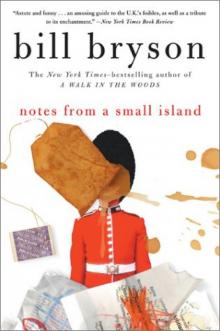 Notes from a Small Island
Notes from a Small Island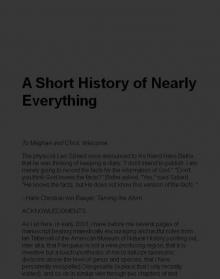 A Short History of Nearly Everything
A Short History of Nearly Everything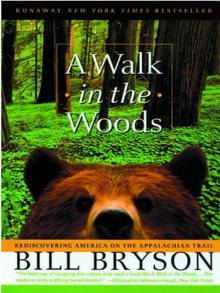 A Walk in the Woods
A Walk in the Woods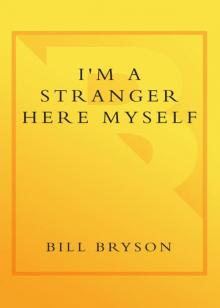 I'm a Stranger Here Myself
I'm a Stranger Here Myself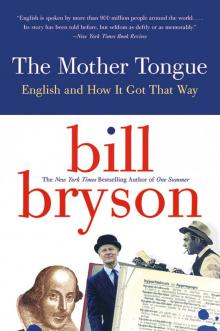 The Mother Tongue
The Mother Tongue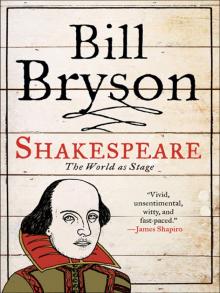 Shakespeare
Shakespeare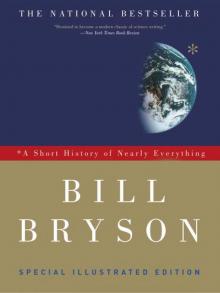 A Short History of Nearly Everything: Special Illustrated Edition
A Short History of Nearly Everything: Special Illustrated Edition The Best American Travel Writing 2016
The Best American Travel Writing 2016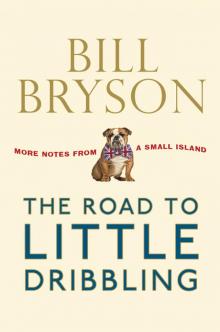 The Road to Little Dribbling
The Road to Little Dribbling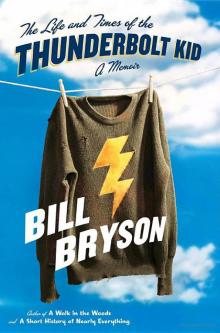 The Life And Times Of The Thunderbolt Kid: A Memoir (v5.0)
The Life And Times Of The Thunderbolt Kid: A Memoir (v5.0)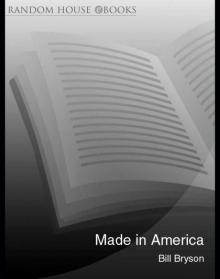 Made In America
Made In America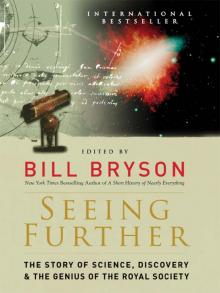 Seeing Further
Seeing Further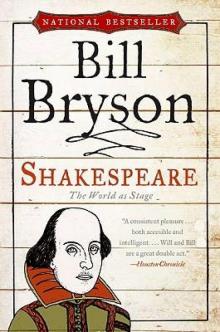 Shakespeare: The World as Stage
Shakespeare: The World as Stage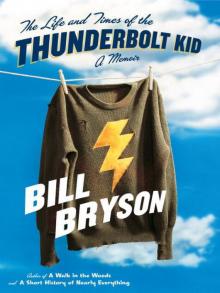 The Life and Times of the Thunderbolt Kid
The Life and Times of the Thunderbolt Kid At Home
At Home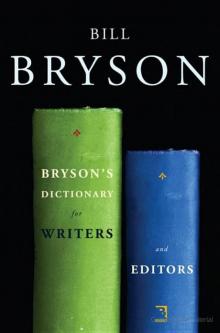 Bryson's Dictionary For Writers And Editors (v5.0)
Bryson's Dictionary For Writers And Editors (v5.0)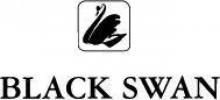 Neither Here Nor There
Neither Here Nor There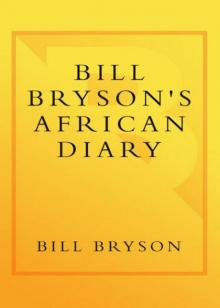 Bill Bryson's African Diary
Bill Bryson's African Diary